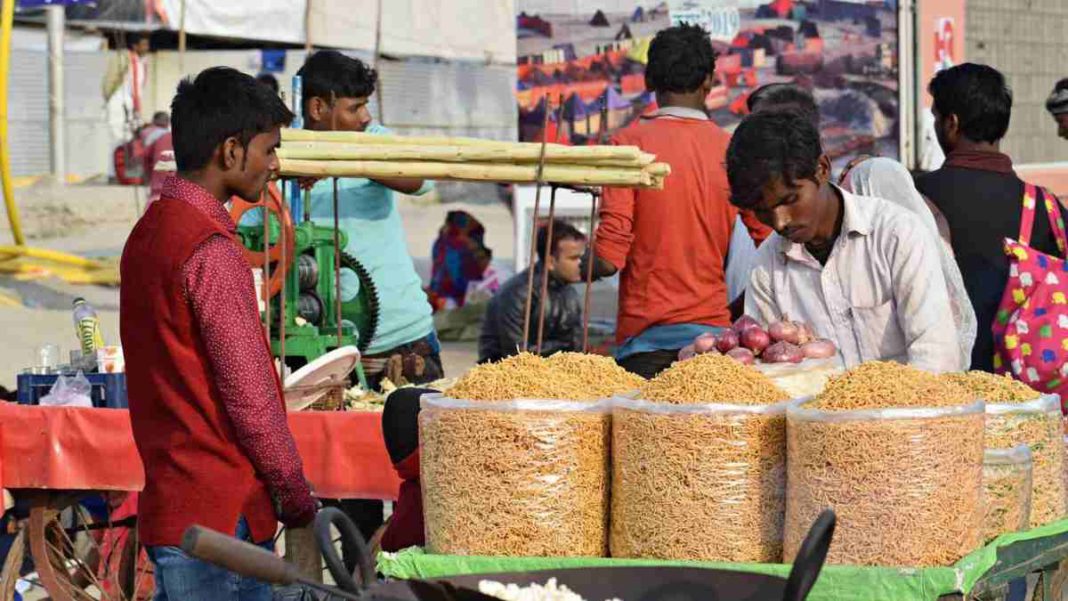INDIA: On International Hawkers Day, street vendors in India find themselves facing various challenges that threaten their livelihoods. They are confronted with the risk of eviction due to large-scale drives, and they also face pressure to comply with regulations banning the use of single-use plastics.
In the early summer morning of 2023, Prakash (name changed on request), while on his way to his small eatery located in a prominent market in Delhi, discovered that his eatery had been demolished and his raw materials had been spoiled. Distraught, Prakash expressed his concerns about an uncertain future as his eatery was his sole source of income and he had a family to support.
Unfortunately, his story is not unique, as many street vendors in metro cities across India face similar threats of eviction despite the constitutional rights granted to them by the Street Vendors (Protection of Livelihood and Regulation of Street Vending) Act of 2014. Sections 12-16 of Chapter III of the Act affirm the rights of street vendors to conduct their business legally and legitimize street vending as a profession. Nevertheless, vendors like Prakash still face the reality of being evicted from their spaces.
Rajesh (name changed on request), who sells seasonal fruits by moving from one street to another with a hand-pulled cart, is another hawker grappling with the challenges of the ban on single-use plastics. Rajesh procures plastic bags from local manufacturers to use as carry bags for selling his fruits. He lives in constant fear of being fined for violating the ban, as the Environment Protection Act of 1986 stipulates penalties of up to Rs 1 lakh or a jail term of up to five years, or both, for such offenses.
Rajesh acknowledges the need to comply with the law but emphasizes the lack of affordable alternatives to plastic bags. Cloth bags, which are a viable alternative, are expensive compared to plastic bags, making them difficult for Rajesh to afford. Despite the legal restrictions, he continues to use plastic bags obtained from a local plastic manufacturer daily.
The Ministry of Environment, Forest and Climate Change, Government of India, has enacted the Plastic Waste Management Amendment Rules, 2021, which prohibit the use of various single-use plastic items with low utility and high littering potential, including polystyrene and expanded polystyrene. These rules have been in effect since July 1, 2022, and encompass the manufacture, import, stocking, distribution, sale, and use of such plastics.
Both Prakash and Rajesh frequently find themselves on the receiving end of eviction drives conducted by civic authorities. Evictions often occur when cities aim to present a refurbished and clean appearance, particularly in anticipation of VIP or international delegation visits, or as routine actions to clear roads of street vendors and hawkers.
While Article 19(1)(g) of the Indian Constitution guarantees citizens the right to practice any profession or carry on any occupation, trade, or business, this right is subject to reasonable restrictions imposed under Article 19(6) of the Constitution.
Street vendors and hawkers are also indirect victims of global warming, exacerbating their struggles. They face the impacts of unplanned and haphazard urban development, resulting in increased instances of cities becoming inundated with rainwater, as well as uncontrolled levels of air pollution due to the unplanned growth of polluting industries within urban areas.
These climate-related challenges further compound the difficulties faced by street vendors. As a significant portion of street vendors are located in the global South, it is crucial to gather more information to understand how the climate crisis affects them.
To support hawkers during the pandemic, the Ministry of Housing and Urban Affairs of the Government of India launched the Pradhan Mantri Street Vendor’s AtmaNirbharNidhi (PM SVANidhi) scheme. This scheme, a Central Sector Scheme, provides street vendors with access to affordable working capital loans to resume their livelihood activities. Its objectives include facilitating working capital loans of up to INR 10,000, incentivizing regular repayment, and rewarding digital transactions.
As of May 25, 2023, the government has received 6,533,344 applications, out of which 4,836,466 have been sanctioned and 4,602,324 have been disbursed. The total amount sanctioned is INR 6,101.5 Cr, with INR 5,740.36 Cr disbursed.
On this International Hawkers Day, the Ministry of Housing and Urban Affairs must continue its efforts in ensuring the implementation of the Street Vendors (Protection of Livelihood and Regulation of Street Vending) Act of 2014. This includes urging states and union territories to conduct Vendor Surveys as mandated by the Act and issue Certificates of Vending to identified vendors.
Additionally, the states and union territories need to activate Town Vending Committees (TVCs) responsible for implementing hawker policies and expedite the notification of vendors’ zones or markets, which are essential for implementing the central law.
To address the current challenges, the need of the hour is an active Central Monitoring Committee that meets at regular intervals to review progress, discuss and resolve any hurdles or issues encountered in the implementation of the Street Vendors (Protection of Livelihood and Regulation of Street Vending) Act of 2014, and share best practices in establishing vending zones and markets, among other provisions of the Act.
Also Read: The Plight Of Street Performers In India



